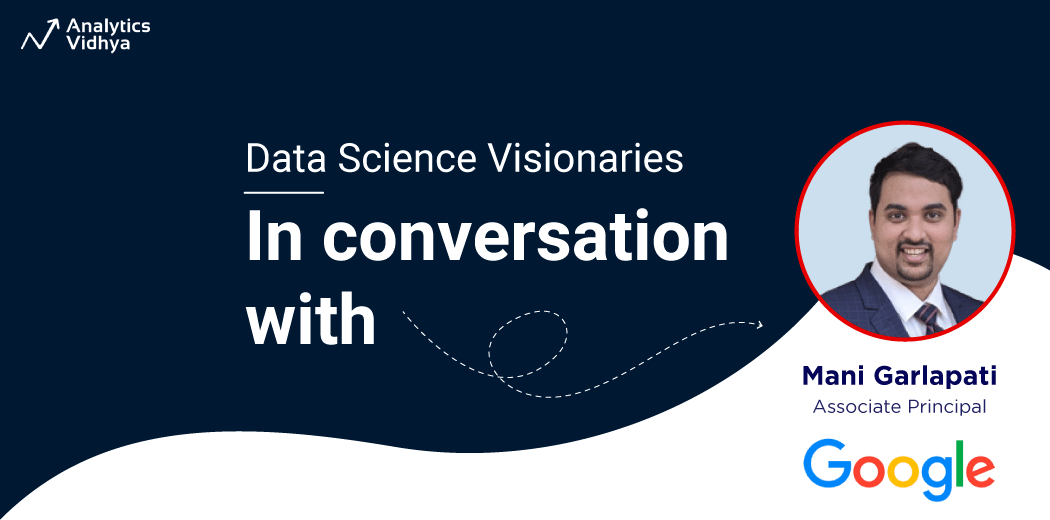Introduction
Tales of triumph and accomplishment often emerge in the ever-evolving landscape of technology giants, showcasing the remarkable journeys of individuals who dared to dream big and worked tirelessly to achieve their goals. At the heart of such narratives lies an associate principal at Google, whose inspiring success story is a testament to the dedication, innovation, and boundless opportunities the tech industry offers. This article delves into the remarkable journey of Mr. Mani Garlapati, a Google trailblazer who traced the path from humble beginnings to becoming a pivotal figure and how his contributions have not only elevated their career but have also left an indelible mark on the realm of technology and beyond.

AV: Can you tell us about your educational background and how it led you to your current position as Associate Principal at Google?
Mr. Mani: My integrated Masters’s and Bachelors’s degree in Tech Finance from BITS Pilani gave me a solid foundation in technology and finance, which likely helped me excel in subsequent roles in the tech industry.
My experience at JP Morgan Chase, Mu Sigma, TCS Innovation Labs, and WalmartLabs allowed me to gain expertise in various domains, including banking, IoT, telematics, text mining, social media analytics, web analytics, NLP, pricing, supply chain, global sourcing, and HR analytics.
These diverse experiences likely honed my problem-solving and analytical skills and ability to work in teams and adapt to different environments.
My current role at Google as an Associate Principal involves overseeing and managing projects related to abuse and fraud detection at scale in the technology domain. My previous experience in various domains equipped me with the necessary skills to handle the complexities of this role and contribute to the team’s success.
Overall, my educational background and professional experience have contributed to my success as an Associate Principal at Google and continue to shape my career path in the technology industry.
Growth Summary

I was determined to succeed in the field of technology and finance. I attended BITS Pilani and completed an integrated Masters’s and Bachelors’s degree in Tech Finance over five years.
After graduation, I joined JP Morgan Chase and quickly became skilled in business intelligence and automation within the banking domain. After a year, I joined Mu Sigma. I spent two years developing IoT, telematics, and text mining solutions, which led to several algorithmic products such as MuRx and MMx.
My next stop was TCS Innovation Labs, where they spent two years delving into social media analytics, web analytics, and NLP within the telecom domain. After this, they moved to WalmartLabs, where they spent four years working on pricing, supply chain, global sourcing, and HR analytics in the retail domain.
After accumulating years of experience, this individual joined Google and began working on abuse and fraud detection at scale in the technology domain. Over the past four years, I have proven to be an integral part of the Google team and have helped to create a safer and more secure online environment for users.
Through hard work, dedication, and a passion for learning, this individual has carved out a successful career path and has become a well-respected and valuable member of the technology industry.
AV: What inspired you to pursue a career in Data Science, and how did you get started?
Mr. Mani: I was initially exploring different career paths, including iOS development, web designing, and KPO, but I didn’t find them to be fulfilling. However, I stumbled upon data science and found it a field that resonated with me.
My interest in data science was sparked by a curiosity for exploring and understanding data and a desire to use data to inform decisions and drive business value. I was drawn to using statistical and machine learning techniques to extract insights from large and complex datasets and the potential to create data-driven solutions to real-world problems.
When I joined Mu Sigma, I had the opportunity to work on various data science projects in different domains, which allowed me to gain hands-on experience and develop a strong foundation in data science skills. I have learned about various techniques such as data preprocessing, statistical modeling, machine learning, and data visualization, and gained exposure to tools and technologies such as Python, R, SQL, and Tableau.
My experience at Mu Sigma likely helped me to gain a deeper understanding of the field of data science and allowed me to work with talented data scientists and learn from them. This experience likely changed my career trajectory and gave me the direction and purpose I sought.
Overall, it seems that a combination of curiosity, interest in data, power to solve real-world problems, and exposure to the field through my experience at Mu Sigma were the key factors that inspired me to pursue a career in data science.
Obstacles in His Journey!
AV: Can you describe a particularly challenging project you worked on in your career and how you overcame the obstacles you faced?
Mr. Mani: Why do customers call? Using complex unstructured data from email conversations. This project presented a major challenge in terms of building categories and identifying patterns in the data.
To overcome these obstacles, we utilized a combination of natural language processing (NLP) techniques and innovative solutions. NLP techniques use computational methods to analyze and understand human language and are often used to extract insights from unstructured data.
I have used text clustering, which involves grouping similar pieces of text based on their content. This can help identify common themes or topics in the data, which can then be used to build categories and identify patterns.
In addition to these techniques, I have also employed innovative solutions such as sentiment analysis, which involves analyzing the emotions and attitudes expressed in the text, or named entity recognition, which involves identifying and categorizing named entities such as people, organizations, and locations.
Overall, using NLP techniques and innovative solutions helped me overcome the challenges posed by this project and enabled me to extract relevant reasons from email conversations successfully. This likely required a combination of technical expertise, creativity, and persistence and is a testament to my skills as a data scientist.
AV: How do you stay up-to-date with the latest developments in AI and trends in the technology field, and what resources do you rely on for this?
Mr. Mani: Webinars are a great way to stay up-to-date with the latest trends and developments in AI and technology. Industry experts conduct webinars and provide valuable insights and information about new tools, techniques, and best practices.
I also rely on articles and research papers to stay informed about the latest advancements in AI and technology. These resources can help me understand new concepts and approaches and provide an in-depth analysis of emerging trends.
In addition to webinars, articles, and research papers, I stay current by reading news articles and keeping up with industry publications. This can help me stay informed about the latest developments and trends in the field and provide insights into how these developments can impact my work.
Finally, I also rely on hands-on practice with new libraries and tools to stay up-to-date with the latest advancements in AI and technology. By experimenting with new libraries and tools, I can gain practical experience and develop a deeper understanding of how they work and how they can be applied in real-world scenarios.
Tips for Data Analysts
AV: Can you share a few tips for students and young professionals interested in pursuing a career in Data Analytics?
Mr. Mani: Some of the tips are as follows:
- Gain practical experience: One of the best ways to prepare for a career in data analytics is to gain practical experience by working on real-world projects. This can include internships, co-op programs, or personal projects.
- Develop a strong foundation in statistics and mathematics: A solid understanding of statistics and mathematics is essential for data analytics. Make sure you have a good understanding of concepts like probability, linear algebra, and calculus.
- Learn programming: To work with data, you must be proficient in at least one programming language, such as Python or R. Make sure you learn the fundamentals of programming and practice writing code.
- Keep up with the latest technologies and tools: The field of data analytics is constantly evolving, so it’s essential to stay up-to-date with the latest technologies and tools. Attend conferences, read industry publications, and participate in online forums to stay informed.
- Embrace failure: Don’t be afraid to try new things and experiment with different approaches. Data analytics involves a lot of trial and error, so it’s essential to be willing to fail and learn from your mistakes.
- Communicate effectively: Communicating your findings and insights effectively is essential for success in data analytics. Make sure you can explain complex concepts in a way that’s understandable to others and be able to present your findings clearly and concisely.
AV: Can you talk about a time when you faced a failure or setback in your career and how you bounced back from it?
Mr. Mani: I faced a setback in my career when waiting for a promotion that didn’t come through. Despite my hard work and dedication, things didn’t work out in your favor.
However, instead of dwelling on this setback, I focused on preparing myself for a better role and organization. I didn’t complain to my manager or become discouraged. Instead, I took action to improve my situation.
My hard work paid off, and I was offered Bain Consulting and Google roles. These opportunities allowed me to develop my skills and experience further and advance my career.
This is an excellent example of how setbacks and failures can actually lead to new opportunities and growth if you approach them with a positive attitude and a willingness to learn and improve. By staying focused on our goals and continuously working to improve our skills and knowledge, we will be able to bounce back from the setback and ultimately achieve success in our careers.
Work-Life Balance
AV: How do you balance your work responsibilities with your personal life, and what strategies have you found most effective for managing your time?
Mr. Mani: It’s essential to prioritize our family and personal life above work responsibilities. This means setting boundaries and limits on our work and being able to disconnect from work when we’re not on the clock. It’s also essential to take care of our physical and mental health and make time for activities and hobbies we enjoy.
Some effective strategies for managing time and balancing work and personal life include setting clear working hours and sticking to them, delegating tasks when possible, learning to say no to unnecessary commitments, and taking regular breaks throughout the day to recharge and refresh.
Taking vacations and exploring new interests can also help to maintain a healthy work-life balance. By taking time away from work and engaging in activities that one can enjoy reduce stress and improve overall well-being.
Ultimately, finding a strategy that works for you and your unique situation is the key to balancing work and personal life. Finding the right balance may take some trial and error, but with persistence and dedication, one can achieve a healthy work-life balance and succeed both in their career and personal life.
Skills for a Successful Career in Technology Industry
AV: What are some of the most important skills or qualities essential for success in the technology industry?
Mr. Mani: Yes, of course! In my opinion, here is the list of skills and qualities that one must build up:
- Thought leadership: Thinking strategically and creatively and creating innovative solutions to complex problems.
- Next-level thinking: Having a forward-thinking mindset and the ability to anticipate future trends and changes in the industry.
- Communication and presentation: Clearly and effectively communicating ideas, concepts, and technical information to technical and non-technical audiences.
- Piping things: The ability to take abstract concepts and turn them into tangible, actionable plans and projects.
- Tools and processes: Having strong technical skills and knowledge of the latest tools and processes in the industry.
Other essential skills and qualities for success in the technology industry include adaptability, problem-solving skills, leadership abilities, a willingness to learn and stay up-to-date with the latest industry developments, and a passion for technology and innovation.
It’s important to note that the specific skills and qualities needed for success in the technology industry may vary depending on the specific role, company, or industry sector. However, developing a strong foundation in the skills and qualities listed above can help to set up for success in a wide range of technology-related careers.
Insights on Google
AV: How does Google create a culture of innovation, and what initiatives or programs has the company implemented to encourage and support innovation among its employees?

Mr. Mani: Google has created a culture of innovation by fostering a supportive environment where employees are encouraged to take risks and pursue new ideas. The company has implemented several initiatives and programs to support innovation among its employees, including:
- 20% time: Google’s famous 20% time policy allows employees to spend one day per week working on projects that interest them, even if they are not directly related to their core job responsibilities. This policy has led to many of Google’s most successful products, such as Gmail and Google News.
- Innovation challenges and competitions: Google regularly runs internal innovation challenges and competitions, encouraging employees to submit their ideas for new products or features. These challenges often come with funding and resources to help employees turn their ideas into reality.
- Learning and development programs: Google invests heavily in learning and development programs, providing employees opportunities to develop new skills and stay up-to-date with industry developments. This helps to encourage innovation by giving employees the knowledge and tools they need to pursue new ideas.
- Collaborative workspaces: Google’s open office layout and collaborative workspaces encourage employees to work together and share ideas. This helps break down silos and foster cross-functional collaboration, leading to new ideas and innovative solutions.
- Employee feedback and recognition: Google values employee feedback and provides regular opportunities for employees to share their ideas and suggestions for improvement. The company also recognizes and rewards employees who demonstrate innovative thinking and contribute to the company’s success.
AV: How do you think your AI chatbot compares to ChatGPT regarding natural language processing and conversational abilities, and what steps are you taking to improve and innovate your chatbot’s capabilities to stay competitive in the market?
Mr. Mani: An accurate and scalable generative AI chatbot that can integrate with traditional search engines is needed, considering the pros and cons of both BARD and ChatGPT chatbots.
Through ongoing research and development, Google is constantly working to improve its AI technology, including BARD. Google has a team of AI experts and engineers working to enhance BARD’s natural language processing and conversational abilities to make it more efficient and effective in providing accurate and helpful user responses. Additionally, Google uses feedback from trusted testers and users to identify improvement areas and enhance BARD’s performance. Finally, Google is also exploring integrating BARD with other AI technologies, such as search algorithms and machine learning, to make it more versatile and adaptable in different contexts.
AV: Would you like to suggest some resources for the transitioning or freshers in the Data Science Industry?
Mr. Mani: Yes, sure. Below are some suggestions:
1. Resources for people who are looking for a transition in Data Science
Seek out a mentor in the field of data science who can provide valuable guidance during your transition. Gain insights into the workings of the data science industry across various organizations. Create a targeted list of potential opportunities and diligently prepare for interviews to maximize your chances of success.
2. Resources for freshers
Upon graduating from college, you will find yourself with ample time at your disposal. Take advantage of this opportunity to delve into the vast realm of data science and actively participate in online competitions. By improving your coding skills and becoming proficient in Python, you will gradually gain a competitive advantage over others in the field. You could participate in some competitions by Kaggle, DataHack, and CrowdANALYTIX.
3. Resources for professionals to stay relevant on industry updates
Engage in conferences, discussion forums, and specialized data science programs to actively participate in the field and enhance your skills. Some discussion forums I am part of are Analytics Vidhya Forum, Data Science Stack Exchange, Quora Analytics, LinkedIn Groups, Reddit, etc. These conferences interest me the most, so do check them out! Their names are Strata Data Conference, Data & Analytics Summit by Gartner, Analytics Experience by SAS, etc.
4. Resources, in general, to stay motivated/ develop thought leadership qualities, etc.
Stay updated with research articles, emerging trends, and the evolving data science landscape. Set milestones and targets to foster personal growth, expand your professional network, and align your career path accordingly.
Conclusion
In tracing the extraordinary trajectory of Mr. Mani Garlapati, we are reminded that the nexus of passion, perseverance, and opportunity can lead to unparalleled success. From his role as associate principal at Google to his impact on projects that have reshaped industries, his journey is a testament to the transformative power of innovation and hard work. As we celebrate his accomplishments, let Mr. Mani’s story serve as a beacon of inspiration, propelling aspiring professionals to chase their aspirations and leave an imprint far beyond their titles’ confines. Just as Mr. Mani has proven, within technology and possibility, the potential for growth and achievement is as limitless as the horizons they continue to explore.
Related
- SEO Powered Content & PR Distribution. Get Amplified Today.
- PlatoData.Network Vertical Generative Ai. Empower Yourself. Access Here.
- PlatoAiStream. Web3 Intelligence. Knowledge Amplified. Access Here.
- PlatoESG. Automotive / EVs, Carbon, CleanTech, Energy, Environment, Solar, Waste Management. Access Here.
- BlockOffsets. Modernizing Environmental Offset Ownership. Access Here.
- Source: https://www.analyticsvidhya.com/blog/2023/08/google-trailblazer/



